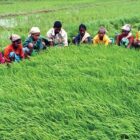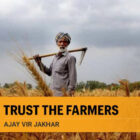There is nothing black and white, every policy and decision is grey, some with deeper hues of black or white. Policies represent trade-offs between benefits to one and losses to others.
The Roman emperor, Marcus Aurelius, believed that “everything we hear is an opinion, not a fact. Everything we see is a perspective, not the truth,” something that holds true when we evaluate any policy implementation in agriculture,” says Mr Ajay V. Jakhar, Chairman, Bharat Krishak Samaj, New Delhi.
“At the beginning a decision may appear to be correct and foresighted but later, the same decision may seem wrong or even a complete disaster. As our perception changes, our views on a subject also undergo a change,” he explains
Not entirely a boon
“The green revolution, considered a boon to the nation, helped the country to become self-reliant. “Today many NGOs criticise it. They allege that the green revolution destroyed soil health and caused excess drain of groundwater, increased use of chemicals and fertilisers and such errors.” He argues that the success of the green revolution led to a collapse of extension services. In the absence of proper advisory services, farmers trying to attain more profits started unwisely using excess inputs.
There is also the case of the agriculture ministry proposing and the ministry of environment disposing and, in the process, forcing farmers to continue using excess pesticides and fertilisers, while competing farmers in other countries get access to the latest technologies. Farmers in India are also disadvantaged by urban perception and policy. “These are two different perceptions of the same issue”.
Policy impact
Giving an example of how government policies affect the countryside, he gives an example from his own village Maujgarh in Punjab. The village is situated at the point where Pakistan, Punjab, Haryana and Rajasthan meet. Being a dry rainfed area, millets such as sorghum (jawar), barley (jau), pearl millet (bajra) and oats (javi), gram (channa) were the staple crops. Wheat was rarely grown or consumed.
Today everyone grows wheat and the staple diet changed to wheat. “So, the area gained economically but without that being the intention, the diet of the farmers itself changed,” says Mr. Jakhar. Announcements of Minimum Support Price (MSP) impacts farmer produce. Nearly 90 per cent of the procurement under MSP comprises wheat and rice.
Incentivised output
“We are incentivised to increase productivity for these two crops to feed the nation. So naturally most of the country is growing these crops …but this monoculture led to a few unintended setbacks in terms of excess use of water, depleting the water table and slowly destroying the biodiversity of the nation,” he explains.
No doubt the policy helped provide food on the table but, at the same time, changed the culture of the whole nation. In a bid to control inflation and keep prices down for the urban consumer, the government banned export of agriculture commodities and forced subsidies on the farmer. Thus the farmer is denied access to international markets where the price of most commodities is higher.
Therefore the farmer, unable to get a better price for his produce, uses more inputs (fertiliser and chemical) to attain better profit. Short term gains to increase productivity and to help the urban consumer, destroys the soil health and depletes the ground water.
Impact analysis
“A social impact analysis is necessary to understand the implication of any policy. Reliable data is unavailable and the science of social impact analysis is still not developed in India. We also need to calculate the cost of lost opportunities imposed on us by bad policies and public interventions by NGOs,” he explains.
Investing in new plant bio technologies that develop plants that maximise use of applied inputs and possibly manufacture their own nitrogen requirement and are pest resistant can reduce fertiliser and chemical usage.
Trade-off
“There is nothing black and white, every policy and decision is grey, some with more shades of black or white. Everything is a trade-off between benefits to one and losses to others,” says Mr Jakhar. Policy makers, opinion makers and NGOs incorrectly look at the issues in terms of just right or wrong. Their arrogance or ignorance is fatal to a nation because, after all, their perceptions lead to specific actions, according to him.




